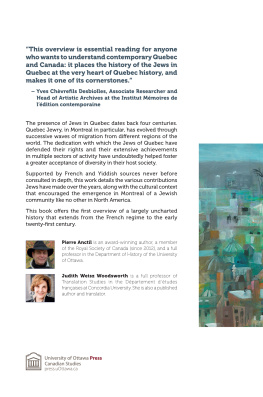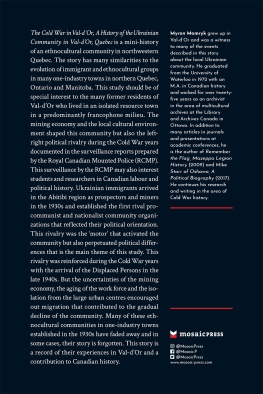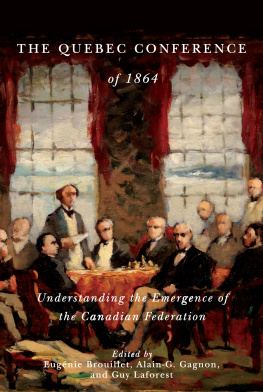CONTENTS
PART I
PART II
PART III
PART IV
PART V
PART VI
INTRODUCTION
A book about Stephen Harpers 2006 election and his blind date with Quebec is inevitably a book about two missed rendezvous with history.
One is the realization of the Quebec sovereignty movements goal for full-fledged statehood for the province; and the other is Paul Martins fulfilment of his presumed destiny as a great Canadian prime minister.
Both had been forecast, by different seers, to take place around the beginning of the new century. Neither materialized. Reading the tea leaves of Canadian politics to get a glimpse into the future is always a risky business.
In October 1995, the Quebec sovereignty movement looked to be so close to its goal that many pundits doubted that the Canadian federation would cross into the new century in one piece. But more than ten years have come and gone and while the Quebec movement is hardly a spent force, the post-referendum decade has sapped its momentum. Instead of floating down the current of history, Quebec sovereignists have had to row upstream, struggling just to stay in place, and not always succeeding.
Yet this has also been a decade of missed opportunities on the federalist side, capped by the dismal failure of Paul Martin to make good on the early promises of his leadership.
To all appearances, Paul Martin was the Prince Charming who would seal the Liberal Partys fate as Canadas ongoing governing party. He became leader at a time when the stars were aligned for a new QuebecCanada romance.
The charismatic Lucien Bouchard had gone, a pariah to some within his own quarrelsome movement. The Parti Qubcois was no longer in power, its score in the 2003 Quebec election its worst since it first won power, under Ren Lvesque, in 1976.
The last year of Jean Chrtiens era had been his most successful in Quebec. His resolve to keep Canada out of Iraq, his endorsement of the Kyoto Protocol on greenhouse gases, his conversion to a more transparent regime of political financing and his decision to proceed with same-sex marriage had been home runs in his native province. All was apparently set for Paul Martin to march Quebec back to the federalist altar.
But the Martin who showed up at the doorstep was not the friendly face Quebecers remembered from the 1990 Meech Lake debate when the conditions for Quebec to sign on to the constitution came tantalizingly close to being met, or even the finance minister they had admired in the mid-nineties.
His bouquet had wilted. The red family car was splattered with mud, some of it embedded so deeply that years of trips to the car wash might not restore its shine. The shoes Martin had stepped into when he replaced Jean Chrtien were caked with dirt.
Martin himself had grown into the clumsy politician who shot himself in the foot by simplistically predicting, in the 1995 referendum on Quebec sovereignty, that a million jobs would be jeopardized by sovereignty. He seemed unable to lead Quebec through a single waltz without crushing his partners toes.
Stephen Harper was the federal leader Quebec voters knew the least about, by far the only one of the four who had never lived in the province. In the end, that only seemed to make him more attractive. Besides, by the time Harper came knocking, Quebec was all dressed up with nowhere terribly exciting to go. The Conservative surge in Quebec was the big surprise of the 2006 federal election. Decades of conventional wisdom flew out the window that night.
If there was ever a match not made in heaven, this was it. Canadas social-democrat province par excellence had bestowed the princely gift of a national mandate on the most conservative prime minister in modern Canadian history, and certainly the only one to pride himself on not being called progressive.
Since January 2006, Harper has striven to turn his unlikely blind date with Quebec into a lasting relationship. But at what cost to his personality, and that of his party?
A stolen kiss is not necessarily the beginning of a great love affair, but its better than nothing just ask the New Democratic Party (NDP) which has been spurned by Quebec for all of its history.
The Liberals and the New Democrats have scorned each other in the past, but misery loves company. Trapped in opposition, the NDP has not aged well. And the Liberals dont even have the genes of an opposition party. The time may have come for them to consider uniting against the Conservatives.
Paul Martins rendezvous with history is gone for good a personal tragedy for a man who spent so many years waiting to claim his place at the top, only to come to an inconclusive end, and a setback for a country that invested much of its hope in his destiny. But Martin could turn out to be only the first of a string of disposable prime ministers. In January 2006, voters replaced a Liberal government on probation with an on-trial Conservative regime. It took a profound malaise to throw Quebec into the unlikely embrace of Stephen Harper. That malaise did not suddenly materialize over the brief life of the last Liberal government. On the left and on the right, in Quebec as in the rest of Canada, the coalitions that saw Canada through the twentieth century have broken down. The next majority government in Canada will belong to whomever is the most adept at reassembling the pieces of the federation before it is broken up for good into irreconcilable blocks.
PART I
THE STARS ALIGN
CHAPTER ONE
A PERFECT DAY FOR AN ECLIPSE
I n Canada, the stars align in such a way as to let the Conservative moon block out the Liberal sun about once in a generation. If every forecast were to be believed, January 23, 2006, was going to be such a day.
For weeks, Canadas top pollsters had charted the capricious course of public opinion, and they all concurred. Change of a magnitude that few had imagined when Canadas thirty-ninth federal election had been called, back in November of the previous year, was in the offing. One of Canadas longest electoral campaigns was poised to deliver an unexpected prime minister, Stephen Harper, about whom little was known and much was feared. For weeks, Liberals had been warning voters about an ominous hidden Conservative agenda and a sharp turn to the right in federal politics.
With political observers calling for clear blue skies over much of the country, the Conservatives who converged on the Calgary Convention Centre to watch the election results were as certain of victory as they had been in decades.
In the past, episodes of Tory rule had usually been exciting but unsettling times, periods of uncertain duration ruled primarily by the law of unintended consequences.
The 1979 victory of Conservative prime minister Joe Clark had turned out to be a short-lived distraction. His minority government never reached its first-year anniversary. It was defeated on its first budget vote a few months after the election. Clark was only in office long enough to allow the Liberals to recoup and Pierre Trudeau to get a second wind. That second wind would sweep the country into an era of dramatic change, as he reshaped the Canadian constitutional landscape according to his own designs, and then retired. French power will always exist. No Canada can exist without the support of this province, the Liberal prime minister told the Quebec wing of his party in March 1984, only a few months before his retirement.











